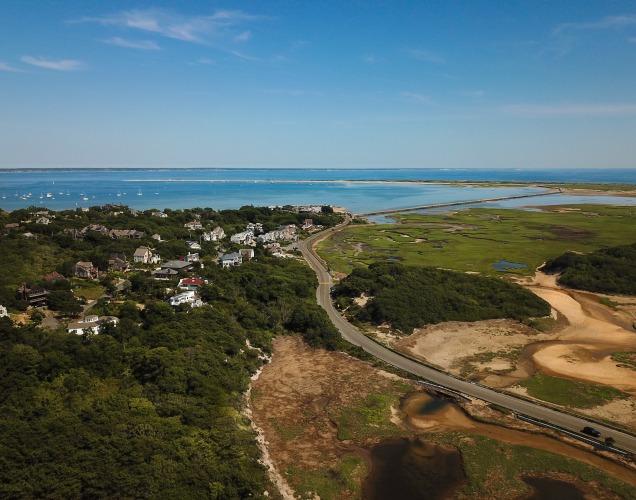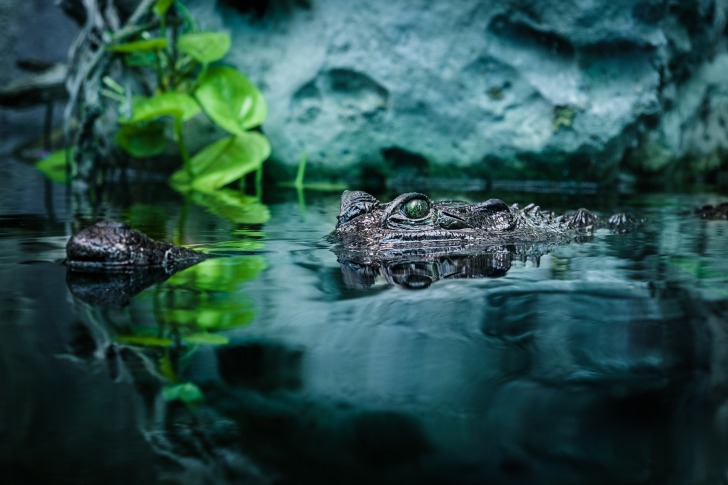How do you tell if it’s an alligator you are looking at in Massachusetts?
It will be small, black, and have a snapping jaw, to be sure!
Alligators are everywhere in the US, whether they want to be or not.
This is mainly through illegal pet ownership.
You typically find this behavior in owners who move reptiles to states where they are not allowed, such as Massachusetts.
Most other people are simply too afraid to handle an alligator of any size!
So, are alligators able to live in this state, and what should you do if you are swimming where alligators are found?
Here is an animal guide about how there are alligators in MA.

Contents
- So… Are There Alligators in Massachusetts?
- Alligator Species in Massachusetts
- Is it Safe to Swim in Massachusetts?
- Interesting Alligator Facts in Massachusetts
- Alligators vs. Crocodiles
- 3 Safety Tips for Swimming in Alligator-infested Waters
- Summary
- Massachusetts Safety Overview
- Frequently Asked Questions
So… Are There Alligators in Massachusetts?
Yes, there are alligators in Massachusetts, but it is not by natural chance.
If you think you see an alligator in the backwoods of MA, be on full alert.
It is when someone accidentally releases them–and is considered an emergency!
Keep in mind, these alligators are most likely to be small enough to live indoors as pets in glass cages.
That means you don’t have to be afraid of seeing a large 12-foot-long giant reptile lounging on your pool deck in Massachusetts any time soon.
That’s a good thing, too!
The bigger the alligator, the larger the appetite and these beasts are not afraid to eat a person in a single sitting.
Alligators attack when they are hungry, and humans are easy targets.
We have seen this through the number of nationwide alligator attacks over the centuries.
That being said, in December 2021, someone spotted a small alligator in a river near their house.
According to Newsweek and Field and Stream, the alligator was a real, live reptile swimming around the waterways of Massachusetts.
It was seen in the Connecticut River in West Springfield, MA.
Not a fake or a hoax, this alligator was seen and captured on camera, and reports were made to authorities.
The authorities on the scene reported it would not be a good winter for the alligator as Massachusetts sees freezing temperatures and frozen rivers.
The Massachusetts Environmental Police and local animal control were involved in the case.
There is also the issue that Massachusetts State Law prohibits the possession of crocodilian species of any kind in the state.
This law specifically states a prohibition against owning alligators, crocodiles, caimans, and gavials.
Therefore, any alligators found in the wild will be removed as soon as possible.
If you try to capture an alligator in MA, you are going to be subject to penalties by state law as determined by this prohibition on the species.
That is why you would want to call the local animal control office as soon as you notice any signs of alligators in your MA community.
The National Wildlife Federation also explains how alligators live in the coastal wetlands of the southeast.
This extends up as much as North Carolina, far below Massachusetts.
As the natural territory of alligators is not MA, it is difficult to see these reptiles cohabitating in New England.
Alligator Species in Massachusetts
The American alligator is the only species of gator that has been found alive in Massachusetts.
Even though the climate is too cold for alligators to breed, as their eggs need warmer temperatures, they can survive in MA.
However, the conditions have to be above freezing and waters need to be moving and not frozen.
You might be likely to see a caiman or gharial in Massachusetts though.
These are smaller, more exotic breeds of crocodiles that are often mistaken for being babies or tiny alligators.
Pet owners who are interested in alligators and crocodiles might be more likely to own one of these exotic types of species.
As a result, you could expect that a caiman or gharial will be released by a pet owner either on purpose or by accident in MA.
This is about the only way such an animal would live in Massachusetts.
Is it Safe to Swim in Massachusetts?
Yes, the Swim Guide reports that it is safe and warm enough to swim in the freshwater and saltwater of Massachusetts.
The waterways are maintained and welcome swimmers in the summer months.
Waters in MA are clean and protected against nuisances and invasive species like the American alligator.
Just be cautious against the release of any pet alligators sunning themselves on rocks like terrapins.
Interesting Alligator Facts in Massachusetts
Alligators show up from time to time and can startle homeowners who see them in their gardens.
It’s true and wild, considering how cold it is that far up north.
According to Newsweek, reptiles are at their peak performance in summertime weather.
When they are in colder temperatures or in the winter season, they go into dormancy and are not as active.
The cooler temps slow the cold-blooded reptile’s metabolism and prevent them from reproducing or laying eggs.
This is why alligators cannot live and breed in Massachusetts, where it freezes each winter.

Alligators vs. Crocodiles
Alligators and crocodiles are so genetically different that they cannot breed with one another.
Isn’t that crazy?
After all, when you see a picture of an alligator and a crocodile, it is very hard to tell them apart.
These are both reptiles that are long and scaly, with a snapping jaw that is full of sharp teeth.
Their tails are equally long and powerful, while they share the same style of arms and legs.
As these are reptiles, both alligators and crocodiles have five toes on each of their forefeet and four toes on the feet of their hind legs, as explained more in-depth by Britannica.
So what is the genetic difference that prevents the two from being…related?
According to the Lubbock-Avalanche Journal, the genetic structure of these two reptiles is 93 percent the same.
It was 90 million years ago when the crocodilian DNA branched out.
This is why we have a distinct seven percent difference between the saltwater crocodile and the alligator, as well as the gharial.
These differences result in the nose or snout of the reptilians being shaped differently.
The saltwater crocodile has a smaller, A-shaped snout.
Compare this to the alligator, which has a large, bucket-shaped snout.
This is great for scooping through mud and brackish water and snapping at prey.
The saltwater crocodile swims in more rapid currents compared to the rivers and ponds of freshwater alligators.
A larger snout would only slow it down when hunting fish and mammals for food.
The size and coloration of the alligator and crocodile are two more differences.
Alligators are smaller than crocodiles, and gharials and caimans are smaller than them both.
Crocodiles max out at 20 feet on average, while alligators might reach 12 feet.
Gharials and caimans grow to be about four feet long as adults.
Alligators tend to be darker black on their scaly hide compared to the bleached-out gray backs of crocodiles.
This is a result of where these reptiles live–crocodiles with salt glands can breed in saltwater.
Freshwater alligators must have warm fresh water to lay their eggs.
The ability to live in fresh versus salt water is perhaps the biggest genetic difference between these two reptilians.
3 Safety Tips for Swimming in Alligator-infested Waters
- Swim with confidence when you are around alligators. Understand that as long as you respect the space and territory of alligators, they will leave you alone.
- Get on board with bright lights wherever you swim. Grab security lights, flood lamps, and waterproof headlamps before you go out into the waterways. This will give you the ability to see those dark hiding places. That’s where frightened alligators might be hiding and waiting to attack.
- Find a swimming partner who is confident with swimming with alligators. They will be your only support and help if you are attacked, and vice versa for them. That’s why you want to go with another adult–not a child or someone who is afraid of water.
Summary
Having an alligator in Massachusetts is not safe due to the climate.
The species is geographically bound by waterways that are much warmer in the Southeast US.
To have alligators in your swimming pool out in the backyard would be a shocking occurrence.
But you would not have to worry about finding alligator eggs since the reptiles can’t breed this far north.
If you do find an alligator, which would be an American alligator or maybe a caiman, you would need to call animal control or 911 immediately.
These reptiles are dangerous and when alone they would become a public threat and dangerous nuisance.
Additionally, removing alligators or crocodiles from your property or the public space would require a professional.
Save yourself from being attacked by an alligator in Massachusetts and let the authorities handle the situation.
Massachusetts Safety Overview
READ THE FULL REPORT: Massachusetts Safety Review
Safety Index:
- OVERALL RISK: LOW
- TRANSPORT & TAXIS RISK: LOW
- PICKPOCKETS RISK: LOW
- NATURAL DISASTERS RISK: MEDIUM
- MUGGING RISK: LOW
- TERRORISM RISK: LOW
- SCAMS RISK: MEDIUM
- WOMEN TRAVELERS RISK: LOW
Frequently Asked Questions
Is it legal to own a pet alligator in Massachusetts?
Considering that the majority of alligator sightings in Massachusetts would have to come from pet owners, this is a great question.
No, the state of MA does not allow for the ownership or possession of any type of alligator or crocodile, including gavials and caimans.
It is also illegal to try to purchase an alligator from a breeder, pet shop, or individual.
Therefore, there is a minimal chance an alligator would be let loose by an owner who was not taking proper care of their reptile.
Now, if you capture a reptile or amphibian in the wild in Massachusetts, this is not always illegal.
Some species of reptiles can be captured and kept as a pet, but not sold or traded as stated by the Massachusetts Society for the Prevention of Cruelty to Animals (MSPCA).
The MSPCA offers additional in-state resources for identifying and capturing reptiles, including alligators.
What are the coldest temperatures in MA that an alligator can survive in?
According to Cajun Encounters, 40 degrees Fahrenheit is as low as the temperature can reach before alligators turn into popsicles.
They are cold-blooded and can live in waters that are cold, but prefer to have warm water for habitat.
To be able to breed and lay eggs successfully through incubation, the water habitat for the alligator would have to be warmer than 40 degrees F.
Therefore, MA is not well suited for the species.
Has anyone ever been killed by an alligator in Massachusetts?
No.
To date, there have been zero fatalities as a result of an alligator bite or attack in the New England state of Massachusetts.
This may be because the only alligators to be discovered in MA have been small and kept domesticated as pets.
Therefore, these alligators are more docile and less likely to have the capacity to kill a large mammal, such as a human.











